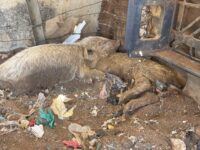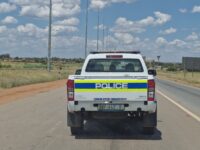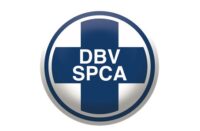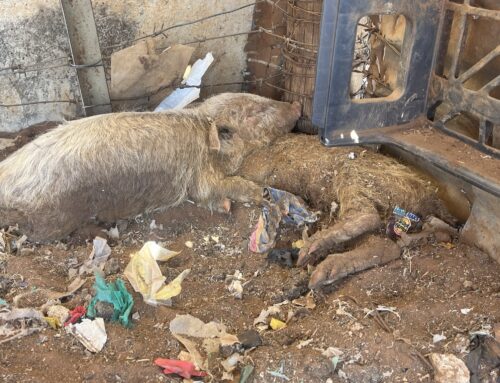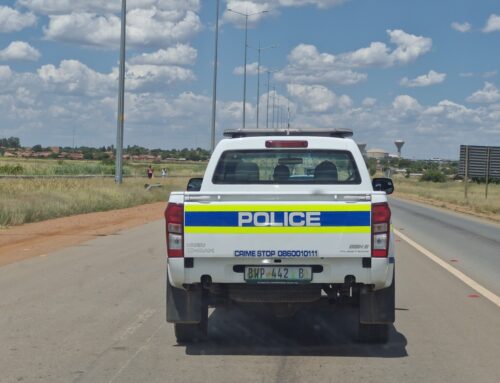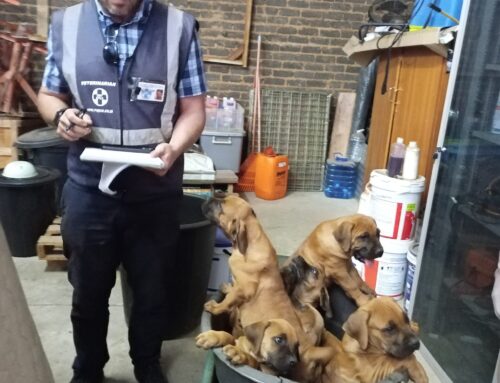A campaign launched by the National Council of SPCAs (NSPCA) that highlighted the rampant crime of dog fighting in South Africa sparked a wildfire on National and International social media. The campaign went live in Johannesburg on Monday 27 June, reaching public uproar only a few hours later and aimed to bring the shocking realities that surround this crime to the awareness of the South African public.
The NSPCA apologises for alarming the public though thanks them for their passionate follow-ups in this regard. The travelling A-frame trailer advertisments that stood at prominent traffic hot spots around Johannesburg boldly advertised “Fight Night”, a pit bull tournament where you could call for bookings or visit a web site for more information.
“Dog fighting is a subject that people should be outraged about,” said Wendy Willson, Senior Inspector and Manager of the Special Investigations Unit at the NSPCA. “In addition to the horrific suffering of the animals involved, the crime has a devastating effect on the people, children and societies where it is happening and the communities who tolerate its existence”.
Dog fighting statistics and its related crimes have grown alarming within South Africa and the NSPCA needs the public’s support and assistance more than ever. Willson went on to say that “We had to resort to drastic measures to bring this appalling crime to the public’s attention quickly and effectively.”
The stereotypic perception that dog fighting is confined to areas of low income and unemployment in communities where education levels are low is exactly what the NSPCA wanted to address through this campaign. “Dog fighting also takes place in affluent areas, amongst educated individuals that hold professional positions and who even contribute to animal causes in their individual capacities,” Willson explained.
Dog fighting takes place under a blanket of secrecy and the perpetrators take extreme measures to ensure that they are not discovered , going so far as to set up organisations masquerading as anti-dog fighting groups in order to direct any tip offs about their activities their way. The perpetrators and supporters of this criminal activity are individuals that seek enjoyment and gain pleasure out of participating in a violent organised blood sport and are individuals that are commonly involved in a multitude of other crimes and acts of violence.
The drastic campaign reached animal lovers and concerned citizens across the country and resulted in numerous caring individuals sharing the advert, reporting information and playing an important part in bringing awareness to South Africans everywhere about this debilitating blood sport. “The response was phenomenal and the National Council of SPCAs is deeply grateful to all the caring and concerned citizens of our country that broke the silence and brought dog fighting into the light.”
Breaking the silence: how you can help.
Should the public suspect clandestine criminal activity specifically with regards to dog fighting, they are urged to contact the NSPCA by:
Email: nspca@nspca.co.za
Phone: 011 907 3590
Website: www.nspca.co.za
Your identity is protected and you can remain anonymous if you so choose.
Your donation will assist us in continuing to expose dogfighters and bring these perpetrators to justice.
Ways to donate are as follows:
SMS the word “FIGHT” to 38018 to donate, Each SMS costs R25. Network and admin fees apply
Adopt a project by signing up for a monthly donation for as little as R50 a month
Make a direct EFT donation:
National Council of SPCAs
Standard Bank
Branch code: 006 405
Account number: 201 032 015
Reference: STOP
The points below will assist in equip the public with knowledge into the crime as well as provide steps on how to help the NSPCA find these criminals out as well as care for and home these animals.
How to recognise dog fighting
A Pit Bull dog fighting ring could be happening right under your nose. The points below highlight what you should be on the lookout for:
Pit Bulls kept on heavy chains or confined in small areas
Residences or properties with multiple pit bulls which are unsterilised, unsocialised or unfriendly to other animals
Pit Bulls who show evidence of repeated injuries
Dogs with multiple scars or injuries on their bodies, especially their faces, front legs, chests, hind legs, thighs and ears
Purpose built fighting pits or square makeshift fighting areas with blood stains on floors and walls
The presence of training equipment, such as slat mills, treadmills, catmills, springpoles or break sticks, or veterinary supplies and steroids
Frequent or regular change in dogs at a specific property. As dogs are killed, new animals are purchased or stolen
A fighting pit on property or inside a house with blood stains and scratch lines
Vitamins, drugs and vet equipment and supplies: Although these items may have legitimate uses, they are often found in connection with illegal dogfighting operations.
About the NSPCA
The National Council of SPCAs (NSPCA) was founded in 1955 as the Federation of SPCAs to provide a forum to bring uniformity to welfare legislation and standards. The SPCAs in South Africa are governed by the SPCA Act 169 of 1993 which is administered by the NSPCA, constituting us as a statutory body. Inspectors are authorised in terms of the Animals Protection Act 71 of 1962 and the Performing Animals Protection Act No. 24 of 1935 with the SPCA movement collectively undertaking over 90% of all animal welfare investigations and prosecutions in South Africa.
Apart from dealing with legislation and specialist matters, the NSPCA also operates in areas where there is no existing SPCA, or where support is required, or has been specifically requested, or in response to disasters (i.e. emergencies, floods, fires).
If you are as passionate about animals and their well-being as we are, consider supporting our causes by donating.
Latest News Posts
Will You Be the One Who Takes Action?
Most people will scroll past this. But will you be the one who stands up for animals?
Animal welfare isn’t always in the spotlight, but it changes lives – for every neglected, abused, or suffering animal we help. Our teams work tirelessly, often behind the scenes, ensuring animals across South Africa are protected.
This work is relentless. The challenges are immense. But with more hands, hearts, and resources, we can do even more.
The equation is simple: the more supporters we have, the greater our reach, the stronger our impact.
Be part of the change. Become an NSPCA Project Partner today. From just R50 per month, you can help ensure that no animal suffers in silence.

